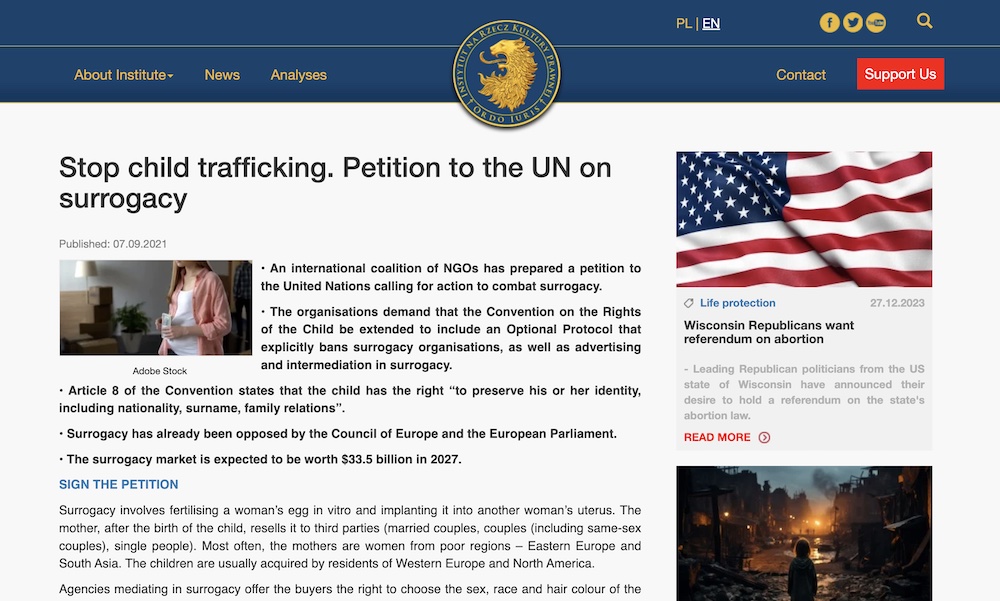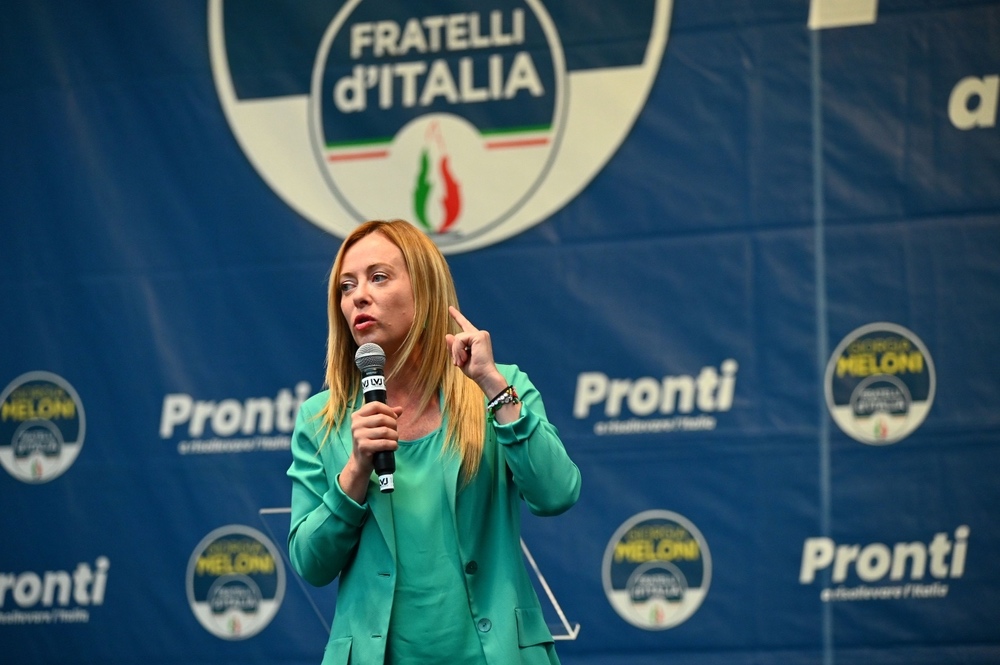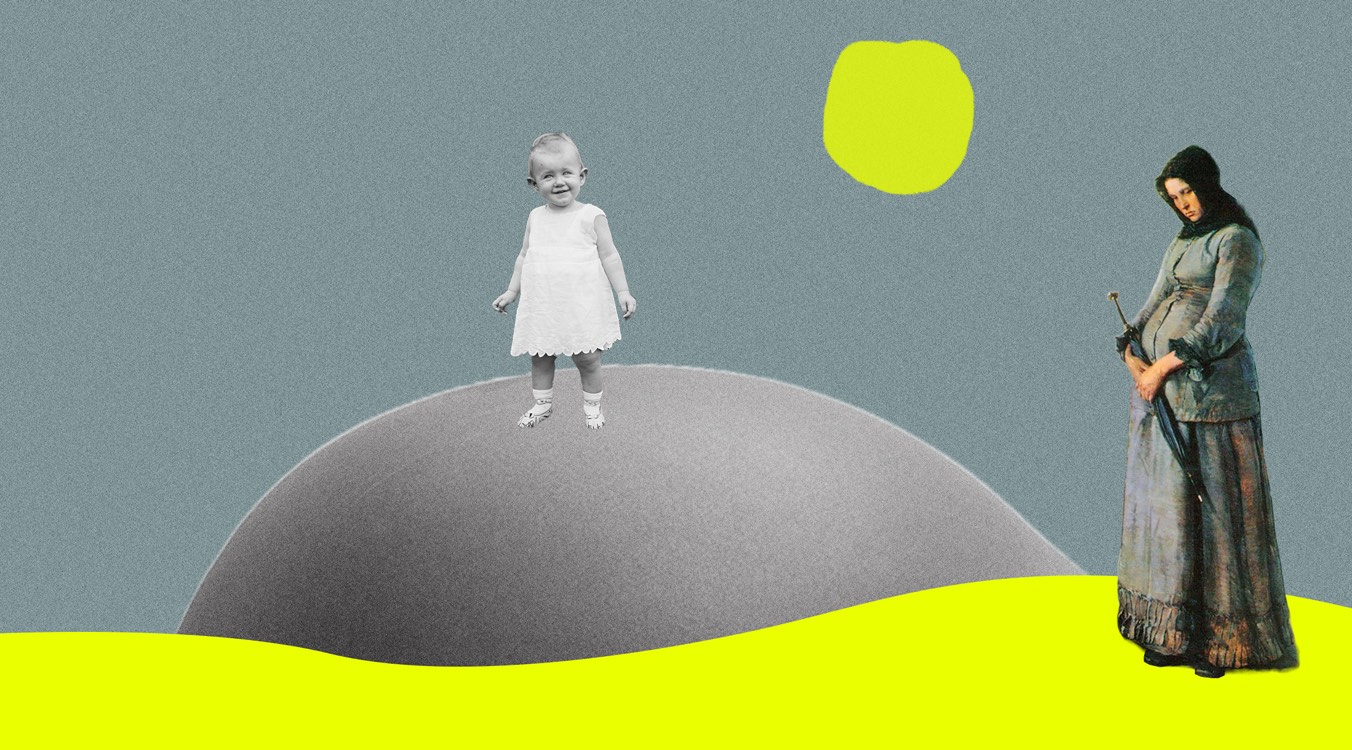in collaboration with Deník N
Illustration: Lenka Matoušková 2024-01-24
in collaboration with Deník N
Illustration: Lenka Matoušková 2024-01-24
Ultra-conservative groups have found a new enemy, and Central Europe is the newest front in this culture war.
In the spring of 2023, the Czech organization Alliance for the Family participated in an international conference in Morocco aimed at banning surrogacy worldwide. More recently, surrogacy has been a recurring topic in the debate over a bill to amend legislation on same-sex unions in the Czech Republic. Czech conservative organizations, such as the Alliance for the Family – which has ties to Trump-linked US groups – have also played a part in this. The issue is also being addressed in other European countries. In addition to ethical issues, a common problem for opponents of surrogacy is the fact that children born via surrogacy may be raised by same-sex couples.
Surrogacy is, of course, not only used by same-sex couples. “Surrogacy is the only way for us to have children,” Anna, who was born with MRKH syndrome, which means she has no uterus and cannot become pregnant, told investigace.cz. Together with her husband Petr, she described how difficult it is not only to find a surrogate in the Czech Republic, but also to plan everything properly to make a mutual agreement work, as the legislation on surrogacy is not regulated in the country. “This also applies to heterosexual couples. I think there are many who cannot have children on their own and for whom this would be a normal solution,” Anna, whose name has been changed for the protection of her identity and so she could speak freely, said.
According to the findings of Deník N’s Prokop Vodrazka, the subject of surrogacy was not addressed during previous parliamentary debates on “marriage for all.” But over the last year and a half, the subject has taken up increasing space in public debates. The conservative Alliance for the Family group, which has actively promoted criticism of surrogacy through a petition and by organizing various events, has played a key role in this. Conservative organizations like the Alliance for the Family have also been involved in several parliamentary proposals.
Alliance within the Alliance
The conference in Casablanca, Morocco, was important to the Alliance for the Family and its anti-surrogacy advocacy. According to the organizers, up to 100 lawyers, doctors and psychologists from 75 countries attended the meeting in early March 2023. The result was a declaration calling for a global surrogacy ban.
Jan Gregor, vice-chair of the Alliance for the Family, and Hana Konečná, a bioethicist and psychologist who has long been close to the Czech Alliance, went to the Casablanca conference. Konečná was also mentioned in the official documents of the event. “Although NGOs do not add their signatures to the declaration, we agree with the intention and we are glad that a member of the Alliance for the Family also signed the declaration,” the Alliance’s Facebook post on the matter reads.
The Casablanca conference reveals how the Czech Alliance is linked to similarly focused organizations from Europe and the US, which are in turn interconnected.
Surrogacy is the process by which an embryo is placed in the womb of a surrogate mother, who carries the child and then gives birth on behalf of another person. The embryo usually consists of the father’s sperm and the mother’s egg. Sometimes another donor may also provide sperm or an egg. The surrogate never provides the egg; the child must not be her biological offspring. There is no legal regulation of surrogacy in the Czech Republic; the practice is not prohibited, but neither is it defined in any way.
The Czech Alliance for the Family became part of an international coalition calling for a universal ban on surrogacy three years ago. That coalition, the Stop Surrogacy initiative, brought together conservative groups from all over the world, including the Polish Catholic organization Ordo Iuris, which registered the coalition’s website. These movements jointly prepared a petition against surrogacy. In addition to the Czech organizations Alliance for Family and Traditional Family, the far-right think tank Political Network for Values, which was to receive money from the Hungarian government, also signed the petition.

Information about the petition against the surrogate on the Ordo Iuris website. Source: ordoiuris.pl
The Alliance for the Family often invites members of foreign conservative organizations to the Czech Republic. These individuals then speak at roundtables or seminars in the Chamber of Deputies.
However, the Czech Parliament has not been idle either, hosting an international conference on 21 November last year titled, “Surrogacy in an International and Czech Perspective.” This was an initiative of three female MPs, Romana Bělohlávková (KDU-ČSL), Nina Nováková (non-attached MP for KDU-ČSL), and Pavla Golasowska (KDU-ČSL).
“We have been dealing with this serious issue on the floor of the Chamber of Deputies of the Czech Republic for more than a year. Therefore, we believe that it is necessary to move forward in our efforts. We are very pleased that after a series of round tables with the participation of many Czech experts, we will also welcome foreign guests,” the organizers said in their invitation to the event.
In addition to bioethicist Hana Konečná and lawyer Jakub Kriz, who cooperate with the Alliance for the Family, the conference featured a speech by Olivia Auriol (who goes by “Olivia Maurel” on social media), who is French but was born in the US state of Kentucky through surrogacy. Olivia Auriol was also an important figure at the conference in Casablanca, Morocco, and became a spokesperson for the declaration that resulted from this international meeting.
Thirty-one-year-old Auriol describes her personal experiences and her fight against the legalization of the practice in France in her public speeches. She says society neglects the impact of surrogacy on children. Auriol says that as a child born through surrogacy, there was always something missing emotionally in her family. She says she shares her story because she also wants to share the negative aspects of the practice, because “we only see the positive aspects in the French media.”
The speakers in the Chamber were mostly critics of surrogacy, such as another French woman, lawyer Aude Mirkovic, from the organization Juristes pour l’enfance (JPL, Lawyers for Children). She also appeared at the Casablanca conference. The JPL criticizes, among other things, the fact that although surrogacy is banned in France, the country still recognises parenthood for couples who have a child through a surrogate abroad.
Activity in Brussels
But in matters regarding surrogacy, the Czech Chamber of Deputies has been overtaken by the European Parliament in Brussels. There, in May 2023, members Bert Jan Ruissen (ECR) and Miriam Lexmann (EPP), together with the European Christian Political Movement, organized a conference on surrogacy in the European Union.
According to the organizers, the EU is pushing member states to accept surrogacy. One example, they say, is the European Parenthood Certificate, which would force national governments to recognise the parenthood of same-sex couples, even if adoption by those couples would not be legal in that country. This certificate could also open the way to the acceptance of surrogacy agreements, even though some countries may prohibit it.
The parentage certificate allows for the recognition of parentage established in one EU country to then be extended throughout the EU and is intended to ensure that children have the same rights in another Member State, particularly with regard to custody, maintenance or inheritance rights.
Adina Portaru from ADF International and Olivia Sarton from the above-mentioned French organization Juristes pour l’enfance, who also participated in the Casablanca conference, were among the main experts at the Brussels conference.
ADF International is the foreign branch of the American Christian group Alliance Defending Freedom (ADF). It is also associated with the Czech Alliance for the Family: Adina Portaru also spoke in the Czech Chamber of Deputies in 2019. The ADF was found by the website Open Democracy to have spent millions of dollars in Europe, with the funds going to ultra-conservative organizations. ADF has been speaking out on the issue of surrogacy and is preparing legal documents criticizing it.
The gray area
“We set up an email that didn’t quite show our names. We found a website that connected potential surrogates with parents who wanted to have children this way,” Anna and Petr said, recalling the time they were trying to find a surrogate mother in the Czech Republic.
They began to contact surrogate mothers and eventually went to the Podkrkonoší region to meet one. She was a twenty-something mother of three who didn’t have much money. “We thought it would really make a difference if we paid for her surrogacy. She seemed like it would make her happy to help someone and it was also clear that the money would improve her standard of living a lot,” the couple said.
Yet the deal didn’t go through because the woman from the Podkrkonoší region had become pregnant with her own child in the meantime. “After that, we didn’t try anything else, not least because COVID-19 came along and we realized that we didn’t have enough saved yet,” Anna concluded.
The couple also discovered a law firm that offered legal services in the area. “It’s all on paper, it’s not backed up by the law,” they pointed out.
The lawyer has reportedly prepared a document describing how to legally treat surrogacy so that the risk would be as low as possible for both parties. According to Anna, some Czech clinics that work with surrogates are also trying to provide legal services. The parents and the surrogate thus conclude a legal agreement, although, as Anna pointed out, this document would not stand up in court. “It’s more about making it clear to both parties that this is a serious matter. That’s how I took it,” Petr added.
According to Anna and Petr, the clinics also want the parties involved to undergo an examination by a psychologist to check, for example, whether the surrogate is aware of what this means and whether she will be able to give up the child she is carrying.
“We know the legal framework of this gray area and we know what we should do now, but we still can’t decide. We still don’t really want to do it because it seems like a risk to have our own child in this way,” Anna said.
Fine or jail
Legislation on surrogacy is also currently being addressed in other parts of Europe, such as in Italy. There, too, criticism of this method of achieving parenthood is linked to the activities of conservative organizations. Surrogacy is currently illegal in Italy, but politicians have nevertheless decided to make the situation more difficult for couples who want to have a child through a surrogate mother abroad—a practice that would be punishable by fines or imprisonment under proposed legislation.
According to Reuters, the bill is part of the agenda of Prime Minister Giorgia Meloni, who has declared herself an enemy of “gender ideology” and the “LGBT lobby.” Lawmaker Federico Mollicone of the prime minister’s party, the Brothers of Italy (Fratelli d’Italia, Fdl), said on television that surrogacy is a crime “more serious than pedophilia.” Another Italian politician, Fabio Rampelli, wrote on his Facebook profile that it is a practice only available to “rich homosexual couples.”

Giorgia Meloni in 2022, Turin, Italy. Source: Wirestock Creators / Shutterstock
Last spring, Giorgia Meloni ordered municipal authorities in Italy to stop issuing certificates on the foreign birth certificates of children of same-sex couples who have used the services of surrogate mothers abroad. Then, in the summer, an Italian public prosecutor in northern Italy demanded that the name of the non-biological mother be removed from 33 birth certificates of children born to lesbian couples, including those dated seven years ago.
The law was also backed by another ruling party in the Meloni cabinet: Matteo Salvini’s nationalist Lega. The latter is a long-time ally of the World Congress of Families (WCF). This is the institution and name of the biennial conference that brings together representatives of conservative organizations from around the world. The WCF conference took place in 2019 in Verona, Italy, to which the organization had been invited by Matteo Salvini, who was also a speaker at the meeting. At the end of the conference, the participants adopted and published a declaration, which included a call for an international ban on surrogacy.
The Southern Poverty Law Center (SPLC), an American non-profit organization, describes how, when the nationalist Lega party came to power, it began to push for legislation in Italy that reflected the ultra-conservative demands of American Christian organizations. The SPLC pointed out as early as 2018 that foreign conservative groups, including the World Congress of Families, had been working together to train, organize meetings, and support influential anti-LGBT organizations in Italy, such as Generazione Famiglia and ProVita.
Surrogacy in Europe and America
Commercial surrogacy carried out with financial compensation for the surrogate is illegal or limited in much of Europe.
It is legal in Ukraine, Russia, and Belarus. Ukraine was the center of surrogacy before the Russian invasion, with thousands of children being born to surrogates a year, some of whom went abroad.
While surrogacy is allowed in Russia, over the objections of Russian religious groups that have criticized the practice, President Vladimir Putin signed a law banning the use of surrogates in Russia by foreigners in December 2022.
The Netherlands and several other countries allow surrogacy under certain conditions. In the United Kingdom, surrogacy can be carried out in an altruistic way, where a woman is not financially compensated for giving birth to someone else’s child. In most such cases, the surrogate is a relative or a person who is close to the prospective parents.
In the Netherlands, the issue was raised after the Casablanca conference. Last March, Conservative Christian MP Kees van der Staaij asked the government to take action against this type of pregnancy and birth. Diederik van Dijn, director of the Christian pro-life organization NPV-Care for Life, is also pushing a ban. He also added his voice to the statements made in Casablanca. Subsequently, the country began to make changes regarding surrogacy for pay. In the Netherlands, it is now legal only in cases where no money is exchanged, as is the case in the United Kingdom, but a complete ban has not been enforced yet.
Surrogacy is also an issue in Georgia, where it is only available to heterosexual couples. The conservative government there has announced that it will pass legislation banning surrogacy for foreigners, effective January 2024. Georgian Prime Minister Irakli Garibashvili has warned that agencies engaged in this form of motherhood could give children to same-sex couples, which are banned in Georgia. Non-commercial surrogacy will remain legal in Georgia only on the principle of altruism and will only be possible for Georgian heterosexual couples.
In Spain, Bulgaria, France, and Germany, all forms of surrogacy, including altruistic ones, are illegal.
In the United States, there is no legislation at the federal level regarding surrogacy, but some states do allow for commercial surrogacy. Conversely, other US states have banned the practice.
The open end
Anna and Petr, the young couple who spoke to investigace.cz, were also thinking about traveling to the United States. “We are informing ourselves about it, thinking about what to do next. But the American trip is terribly expensive from our point of view. It would cost about four to five million crowns,” explained Anna. Her partner Petr added that it is also a very time-consuming solution.
“If we were to go into surrogacy, I don’t want it to end up with us taking advantage of someone. The result will be a child, but I don’t want to exploit anyone. I don’t want some poor woman to do it for money – and have most of that money taken away from her by a middleman,” Anna stressed. Her husband added: “From my point of view, this would support the narrative of the conservative part of the public, where we would pay and come to the incubator nine months later to get the baby. That’s not how I imagine this thing should be done.”
The Alliance for Families organization chose not to respond to the questions sent by Deník N.
The original Czech version of this article was published on investigace.cz
Mahulena Kopecká has worked for the Czech Center for Investigative Journalism since 2022. She writes articles on organized crime around the world and covers topics such as religious and ultraconservative movements. Previously, she wrote for a Czech website focused on foreign news Voxpot.cz and worked for the website of the the public radio broadcaster Czech Radio.







